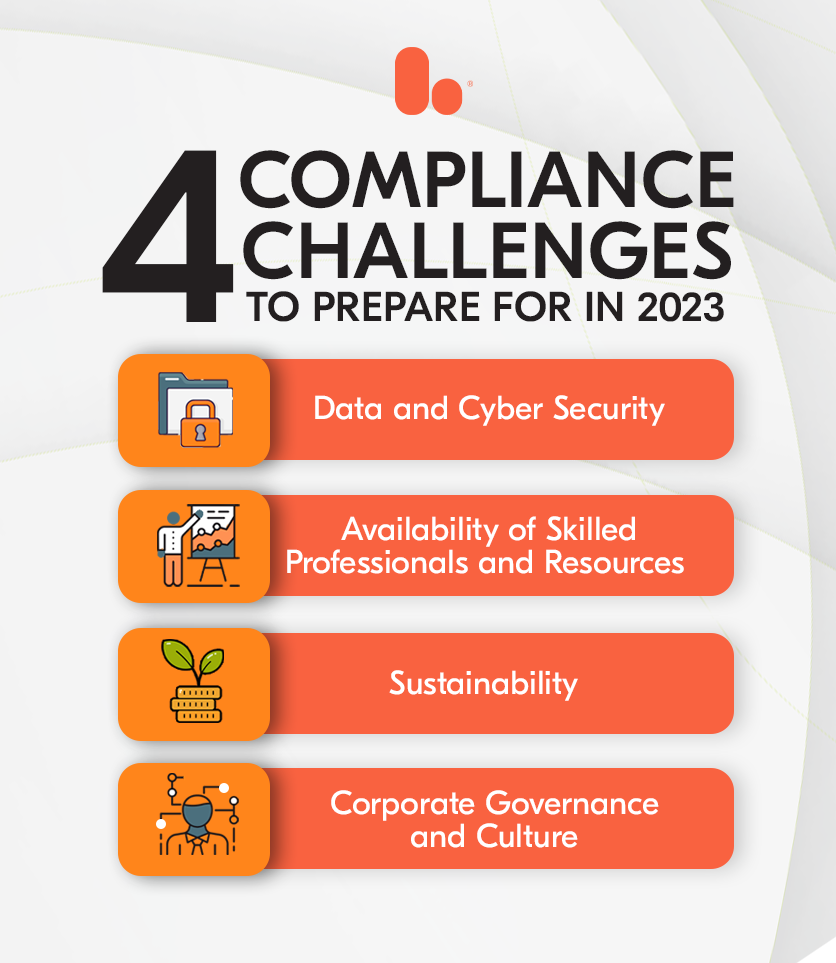2023 Compliance challenges to prepare for in the financial services market
DISCLAIMER: This post was last modified on 21 January 2023. Some information in this article may not be updated.
Compliance across industries covers a variety of concerns. In the financial services industry, rules and regulations pertaining to data privacy, consumer security, anti-money laundering (AML) and Know Your Customer (KYC), among others, are just some of the concerns that market players need to pay attention to.
As we progress in the early stages of 2023, we look at the outlook of compliance and identify the challenges that we should prepare for over the course of the year.
Compliance in 2023
Amidst several developments in the financial markets, investors, managers and other industry participants have a lot to look out for, with compliance being a significant and recurring topic (e.g., crypto scene and in family offices).
The role of tech in compliance
The financial markets are integrating technology to ease the administration of compliance procedures and systems. Regulatory Technologies (otherwise known as “RegTech”), automation, perpetual KYC and digital transformation are just some ways the financial world adapted to facilitate compliance activities.
Ultimately, the employment of technological solutions in compliance matters are aimed at addressing the functionality and efficiency of procedures, including:
- Minimal friction in KYC and Customer Due Diligence (CDD) processes;
- Fewer human errors in regulatory reporting;
- Maximising the resources needed to manage physical documentation; and
- Automating periodic tasks in KYC review process, to name a few.
The downside: the cost of investing in these technological-driven compliance solutions. Securing data and cyber security are also significant factors to consider, which will be discussed in a section below.
Regulatory developments
Financial entities are obliged to act in accordance with relevant rules and regulations that are constantly being introduced in their respective jurisdictions, industry and business activities.
Some of the major regulatory changes that should be expected by financial services players this year are as follows:
| Regulations | Description |
|---|---|
| Anti-Money Laundering Act (AMLA) – Switzerland | Revised amendments of Switzerland’s AMLA will be effective by January 2023. These amendments will mainly cover verification of beneficial owners, client/business relationships data and regulatory reporting of suspicious activities. |
| Markets in Crypto-Assets (MiCA) – European Union | The adoption of the MiCA Regulation will be voted on February 2023. If adopted, the MiCA directive will regulate and govern European crypto assets, as well as related activities and services for the protection of consumers and investors. |
| Sustainable Finance Disclosure Regulation (SFDR) – European Union | The SFDR was initially published in November 2019. Additional (or “level 2”) rules in the SFDR are effective in January 2023 and are aimed to reinforce sustainability-related disclosure requirements for the financial market participants and advisors. |
For further reading on the trends on compliance in the finance market this 2023, refer to our previous blog here.
Imminent challenges in compliance
To guarantee compliance, no matter the sector and how business activities are performed, is to guarantee organisational success, a positive business reputation, employee security and trust from the community. However, as previously established, ensuring compliance with the numerous components associated with it is a challenge.
Here are four challenges in compliance to look out for in the financial services industry.

- Data and Cyber Security
As data regulation and privacy laws are evolving, firms are subject to a challenging position in complying with attacks on data and cyber security in the industry. Global regulatory agencies are constantly churning and updating policies to strengthen the fight towards the protection of financial services clients, and rightfully so.
According to Akamai’s 2022 research on the risk exposures of financial services in the cyber space, the financial services industry is consistently one of the sectors most targeted by cybercrimes. It was also found that 80 per cent of financial services attacks deliberately target client accounts, in preference to the organisation themselves.
With this, firms are challenged to reinforce their cyber security platforms and systems to be prepared for such attacks on security; especially along the excessive cost associated with data breaches valued at a global average of USD 4.35 million in 2022.
- Availability of Skilled Professionals and Resources
Particularly for organisations that operate in several jurisdictions, internal systems and procedures for compliance should not be a one-size-fits all matter. Following this, intricate tasks such as developing KYC platforms, conducting KYC health checks, performing AML audits, to name a few examples, require experienced and knowledgeable compliance teams. Moreover, the already complex regulatory landscape in a diverse financial sector intensifies the demand for compliance professionals.
However, firms are facing challenges in acquiring professional and skilled human resources in addressing their compliance needs. As the duties of such professionals are expanding and their responsibility becoming more consequential, organisations should continue to prepare for the increase in demand for compliance personnel even following 2023.
- Sustainability
There is increasing pressure for companies to integrate environmental, social and governance (ESG) initiatives in their compliance efforts. Aside from the accountability demanded by investors, consumers and partners, firms are especially left with no choice but to incorporate ESG initiatives to fully comply with emerging government regulations.
For instance, firms in the EU region are subject to strict disclosure requirements with the EU Taxonomy. Another example is the recent Corporate Sustainability Reporting Directive (CSRD), which adds to the existing non-financial reporting mandate in the region. The directive aims to increase company accountability as it requires publishing detailed information on business activities in relation to sustainability.
Companies are challenged to ensure complete and accurate ESG data, communicate the roles of team members in achieving ESG compliance and that it is executed at every level of an organisation. Moreover, firms need to be wary of risks in greenwashing, as serious financial and reputational repercussions are present with sanctions in policies concerning fraud and misrepresentation.
- Corporate Governance and Culture
Other essential components of compliance that may be overlooked are corporate governance and culture. A financial service organisation’s commitment to comply with the industry’s best practices and ethical standards are just as important as its legal and legislative obligations.
Just recently, inspections for the ‘big four’ in Spain were carried out due to concerns regarding ethical work hours and their compliance with labour and social security laws.
On the other hand, there is also the challenge of how management teams would set out their systems for their employees to adopt. An organisation’s internal compliance culture can determine how team members will approach and sustain set company initiatives for compliance. With this, creating a strong and positive culture can pave the way for long-term accountability and transparency within the organisation.
What should financial market players do?
In conclusion, internal systems and programs to address compliance should be leveraged and invested in. Moreover, consistent efforts to identify, review and tackle risks in the aforementioned compliance challenges are necessary to execute in every part of the organisation.
To tackle the challenges in corporate governance and culture, senior leaders can initiate and lead on expressing their commitment to compliance. Moreover, constant communication and engagement with team members can be beneficial in setting the tone for a strong and positive compliance culture in an organisation, especially in a highly regulated industry such as the financial markets.
For instance, cyber security measures are made effective with collaboration of all business departments, instead of being an exclusive responsibility of the information and technology (IT) team.
Lastly, corporate entities can reduce legal burden through the assistance of outsourced compliance teams that provide specialised services. In doing so, the challenge of searching for in-house professional and skilled resources can be addressed.
Bolder’s compliance solutions through financial services
Non-compliance puts an organisation’s overall success on the line. Still, it is important to remember that these present and future challenges in compliance can be addressed and prevented with the right tools and guidance.
Bolder Group provides support for private clients and corporate entities looking to streamline their compliance efforts. With our in-house legal team and professionals in 18 countries, we can assist in getting your organisation ahead of all local and international requirements. Provided are our list of services:
- AML and KYC Compliance services
- Provision of AMLCO, MLRO and/or DMLRO
- Automatic Exchange of Information (AEOI)
- Director and Officer Services
Get in touch with a Bolder representative to navigate your way through the compliance challenges in 2023.
Bolder Group does not provide financial, tax or legal advice and the information contained herein is meant for general information purposes only. We strongly recommend that before acting on any of the information contained herein, readers should consult with their professional advisers. The Bolder Group accepts no liability for any errors or omissions in the information, or the consequences resulting from any action taken by a reader based on the information provided herein.
Bolder Group refers to the global network of independent subsidiaries of Bolder Group Holding BV. Bolder Group Holding BV provides no client services. Such services are provided solely by the independent companies within the Bolder Group which are each legally distinct and separate entities and have no authority (actual, apparent, implied or otherwise) to obligate or bind Bolder Group Holding BV in any manner whatsoever. The operations of the Bolder Group are conducted independently and have no affiliation with third party financial, tax or legal advisory firms or corporations.
